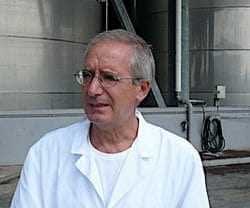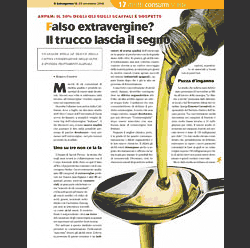By Lucy Vivante
Olive Oil Times Contributor | Reporting from Rome
Italy’s consumer weekly Il Salvagente, is reporting the results of a study by ARPAM, the Regional Agency for the Protection of the Environment, Marche Bureau. The Ascoli Piceno based governmental organization studied 33 extra virgin olive oils from local Marche mills and 35 from supermarkets.
Any new analysis useful to identify good quality is helpful and welcome.
The supermarket olive oils showed an elevated level of alkyl esters, which point to an olive oil produced from poor quality olives. The olives could be damaged, over-ripe, and even fermented. The 33 local oils had an average alkyl ester rate of 15 milligrams per kilo; while the supermarket oils, which were mostly EU olive oils, had an average of 150 milligrams per kilo. Three of the supermarket oils had levels of 1,000 milligrams per kilo, in other words, off the charts.
Casagrande
In November 2009, the International Olive Council decided to include this analysis parameter in its quality standards used for categorizing grades of olive oil. Asked for his comment on the ARPAM study, Renzo Casagrande, Factory Manager of Colavita, said that Colavita has been using this IOC approved test on incoming olive oil since June. He added, “We think that any new analysis useful to identify good quality is helpful and welcome.”
The European Community will adopt the measures (a law has been drafted and is expected to pass and go into effect in early 2011) with extra virgin olive oil being allowed a maximum of 75 milligrams of alkyl esters per kilogram. One third of the supermarket oils studied by ARPAM would, under the new rules, not be considered extra virgin.
Il Salvagente
Il Salvagente reports that Italian olive oil producers wanted more stringent rules (maximum of 50 milligrams), while Spanish producers wanted a higher acceptable level (100 milligrams), and a compromise was reached with the 75 milligram number. High levels of alkyl esters, at least in some cases, point to a deodorized oil, although deodorizing oil does not lessen the presence of alkyl esters.
Deodorizing, just as it sounds, removes an unpleasant odor from oil, and oil made from degraded olives has a bad smell. Deodorized oil mixed with a fruity oil can, at least in theory, pass sensory tests, and be sold as extra virgin.
Dr. Enrico Corradetti, director of the Marche lab where the study took place, told Il Salvagente that a high level of Oxyfluorfen, a chemical used to treat olives, elevates the alkyl esters in olive oil, and his organization will do further research on the subject.
The ARPAM research found that pesticide and herbicide residues were found on 85% of the supermarket brands vs. 15% on the local oils. Perhaps more troubling was the fact that 35% of supermarket oils, and 15% of local Marche oils, had residues from banned herbicides and pesticides. The lab found the following plant treatment chemicals: Oxyfluorfen, Metathion, Endosulfan, and Dicofol (DDT related).



